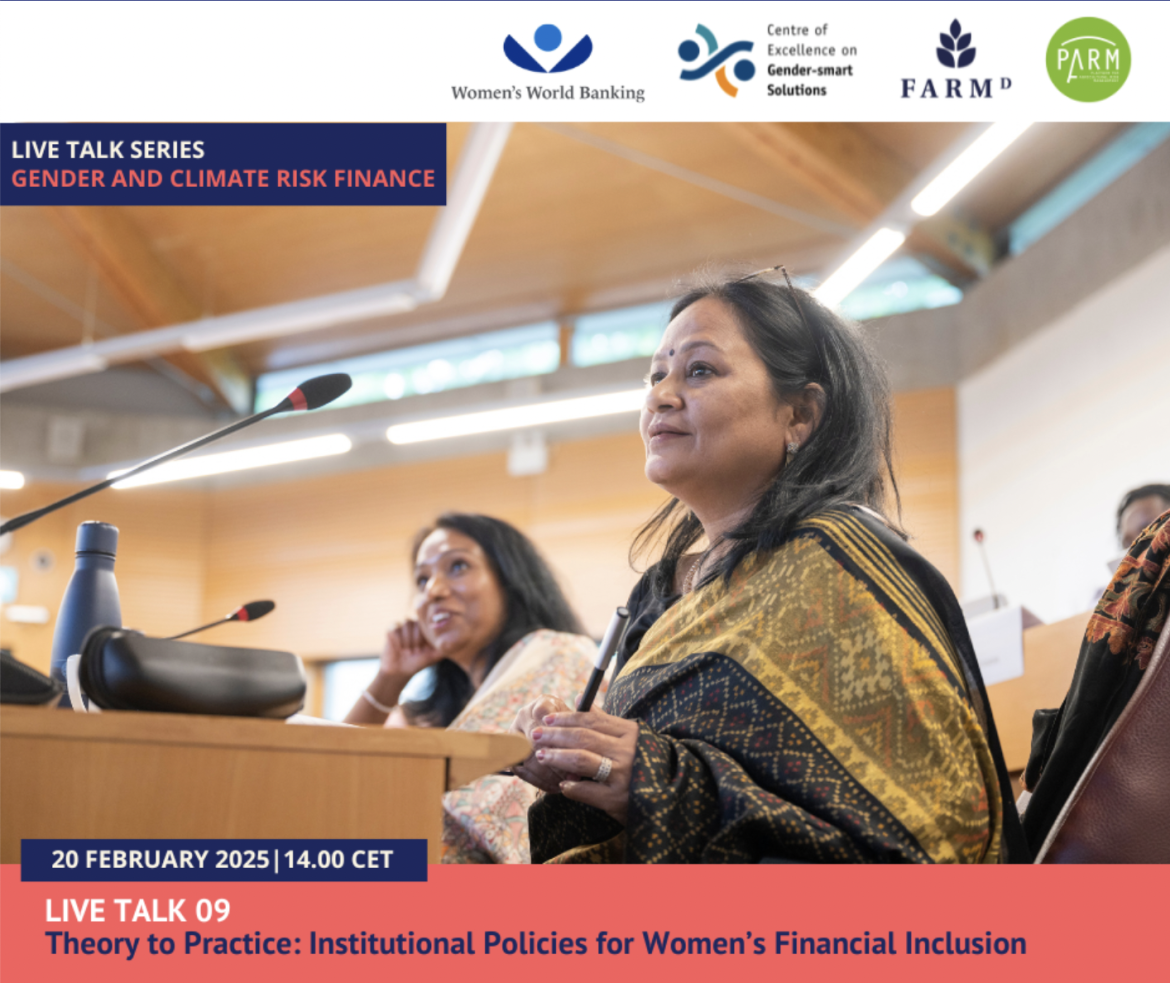Breaking Barriers: How Morocco and Ghana Are Leading Gender-Inclusive Insurance Reform

On February 21, 2025, the ninth session of the LIVE TALK series, From Theory to Practice: Advancing Women’s Financial Inclusion, brought together a diverse group of attendees to explore solutions for bridging the gender gap in financial inclusion. Co-organized in collaboration with FARM-D (hosted by PARM), Access to Insurance Initiative (A2ii), and Women's World Banking, and the Centre of Excellence on Gender-Smart Solutions, the session focused on the transformative role of leadership, sex-disaggregated data, and policy development in driving gender-sensitive financial systems.
The session provided a valuable opportunity for members of the development community, including representatives from the IFC Global Index Insurance Facility (GIIF), to explore gender-focused innovations aligned with inclusive insurance goals.
The Live Talk featured alumni of Women’s World Banking’s Leadership and Diversity Program for Regulators, to share their experiences from the program, highlight the importance of gender-responsive policy in the insurance industry and initiatives they are championing after their participation in the LDR program. Two distinguished 2024 alumni of the LDR program, Mouna Chentoufi, Head of the International Relations Department at ACAPS Morocco, and Stella Jonah, Head of Supervision at the National Insurance Commission of Ghana, shared how they have translated their learnings into actionable reforms.
The session commenced with contributions from Divine Torkutsah of the Centre of Excellence on Gender-Smart Solutions, Joscha Sisnowski of the Access to Insurance Initiative (A2ii) and Elizabeth Ingerfield from Women’s World Banking, giving insights into the innovations and activities of their respective entities to promote, develop and ensure gender-responsive implementation of policies and programmes through developing knowledge resources, toolkits and capacity development efforts to enhance financial inclusion for women.
LDR Alumni Experiences
Mouna Chentoufi and her team at the Supervisory Authority of Insurance and Social Welfare (ACAPS), Morocco, recognizing the lack of sex-disaggregated data in Morocco, are developing a policy to collect sex-disaggregated data, followed by a stakeholder engagement and awareness program for the insurance industry. The objective of the policy will be to foster an insurance industry that uses available data to design policies that are accessible and contribute to the resilience of vulnerable populations.
A three-step approach is designed to implement this policy. A multidisciplinary team was formed to conduct a supply side analysis on 150 insurance contracts to identify barriers encountered by women; Launching a stakeholder outreach and engagement plan that will offer training and advocacy sessions on the use of data to design insurance products; Analysis of the collected data with the industry players to identify innovations and solutions that target women.
Mouna emphasized that networking and collaboration with peers have been essential to their success. As she puts it, “Network is the magic,” highlighting the power of peer learning in driving progress.
In Ghana, Stella Jonah, head of prudential supervision at Ghana's National Insurance Commission, presented the initiative “Advancing Gender and Diversity and Women’s Participation on the Boards of (Re)Insurers in Ghana.” With only 16% of board members in the sector being women, her team introduced a policy to achieve at least 30% female representation on boards of (re)insurers in Ghana. The policy is supported by a five-year phased implementation plan focused on training and leadership development. A cornerstone of its success has been stakeholder engagement, with thorough mapping and alignment ensuring broad support for gender diversity initiatives across all levels.
These achievements underscore the power of collaboration, capacity building, and data-driven approaches in creating financial systems that serve everyone, especially women who have traditionally been underserved. Tools such as A2ii’s FeMa-Meter and Resources from the Centre of Excellence have proven essential for gathering gender-disaggregated data and guiding evidence-based policymaking. Together with the Women’s World Banking leadership program, these collective efforts are charting a path toward a more inclusive financial future.
While challenges remain, collaboration, innovation, and shared learning are setting a sustainable course that promises a lasting impact on women's financial inclusion worldwide.
Missed the event? Watch the full recording on YouTube here.
